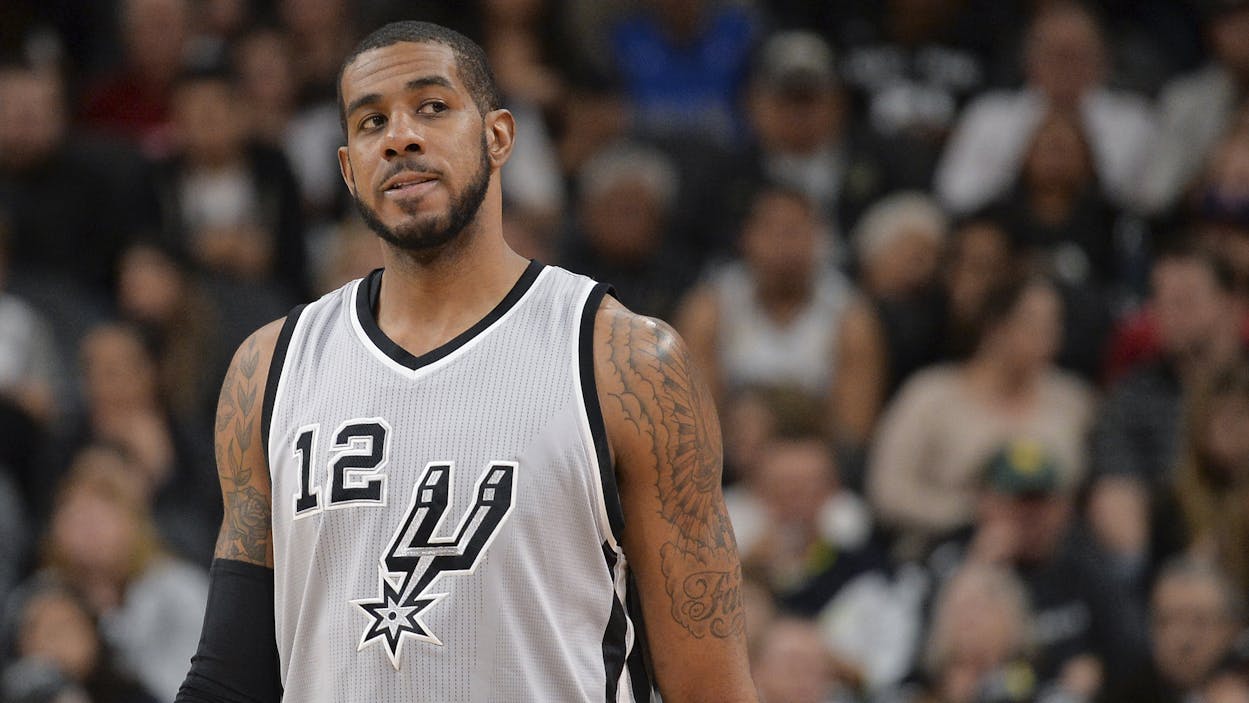When the Cavaliers blew out the Spurs on national television Saturday night, it was obvious that San Antonio was missing a cog in its machine. Yes, the Spurs miss Tim Duncan, but alas, his knees are acting their age and Gregg Popovich doesn’t mind giving them a rest.
Truthfully, the Spurs were missing a lesser piece, one whose jersey will never hang from the rafters in San Antonio. They were missing Brazilian big man Tiago Splitter, jettisoned in early July to make room for LaMarcus Aldridge. Splitter’s exit last summer was necessary—the Spurs received enough cap space to sign the NBA’s premier free agent last summer and also cleared out some front-court minutes needed for the the Trail Blazers’ former superstar. At the time, it was a lauded move; only an evil genius like San Antonio’s general manager R.C. Buford could figure out how to essentially “trade” Tiago Splitter for a perennial All Star. Although Aldridge is having his worst season as a defender, he’s still one of the twenty best players in the NBA. And though his points per 36 minutes are down, he’s still an effective scorer. But on Saturday evening, light shone through a Splitter-shaped hole in the Spurs’ defense.
To be clear, and before we go any further, Aldridge is a better overall basketball player than Splitter by a country mile, and thus a more valuable asset to an NBA team. It’s a small sample size, but Aldridge’s offense is coming around this week in a year when his overall point totals have suffered. When Aldridge gets hot from mid-range, like on Monday, when he tallied an extremely efficient 28 points in 32 minutes on just 13 field goal attempts against Orlando, Buford and Popovich’s personnel adjustments look increasingly prescient. Fittingly, on “Iceman Night,” honoring legendary Spur George Gervin, Aldridge looked fearless and unstoppable with the ball in his hands. Iceman 2.0 looked good enough for everyone to forget about losing Splitter. On Wednesday night, he notched a season-high 36 points against a decidedly mediocre Pelicans team. If he can sustain this level of efficiency in more challenging games, it’s a no brainer: the Aldridge experiment is working.
Furthermore, as Duncan likely heads out to pasture after this season or next, Splitter isn’t the type of franchise player to replace him. No one will blame Buford for making this move even if the Spurs can’t beat the Warriors in the playoffs; any general manager operating at full capacity (any manager not named Billy King) would have swapped out Splitter for Aldridge.
Negotiating the NBA’s salary cap rules for an everyday citizen such as myself is a task bordering on futility. There are trade exceptions and offsetting salaries and seemingly arbitrary restrictions on when and where certain players can be traded, so an answer as simple as keeping Splitter and finding the space for Aldridge is both hyper-reductive and performed with eagle-eye hindsight. Maybe the Spurs didn’t want to part with Danny Green, who looks like a more important component as the season wears on. Perhaps they tried to ship Diaw out before relenting and giving up Splitter when no one nibbled at the dangled Borista. It’s also entirely possible that they know something we don’t about Splitter’s decline—sometimes it’s better to cut bait earlier than later.
But Aldridge came out of the gate sputtering this season. He looked slow in transition on both ends of the court, and some writers (this one included) wondered if he seemed unhappy in a situation where he wasn’t a big fish in a small pond as he was in Portland. When Aldridge complained about Popovich’s conservative tactic of sitting his stars in meaningless games, Pop told the media, “He didn’t want to. But welcome to the Spurs.”
The Spurs’ sustained success, unprecedented as it is, doesn’t hinge merely on a grouping of extremely good players (though, of course, having those don’t hurt). The reason Popovich has five rings is because of the brilliant architecture of the Spurs, the structural components all reliant on each other to remain standing. The intricate puzzle of the Spurs’ world-class defense is missing a piece, at least as long as Duncan is out.
This also, of course, presupposes that Popovich isn’t trolling everyone again by throwing out wonky lineups, resting his stars, and otherwise not showing his hand before the midseason turn. It wouldn’t be the first time. And after all, why should he care about a regular-season game against Golden State or Cleveland in January? It’s not like the Spurs are in danger of missing the playoffs or even slipping from its top spot in the West.
But the Spurs looked lost without an effective second big man to pair with Aldridge in both losses last week. David West and Diaw are nice bench depth, and the type of players you absolutely need on a championship contender, but neither can replace what Splitter provided. Aldridge on his own is an excellent offensive player and an above-average defender and rebounder, but if Duncan is seriously injured in the playoffs, it’ll spell doom for the Spurs’ championship hopes. Here’s where having Splitter on the bench would have been nice, screams every armchair GM.
Ultimately, Buford and Popovich’s secret to success really isn’t a secret. They construct deep, balanced rosters composed of lineups that can be mixed and matched against the best in the league. They’re also a much smarter executive team than any other in the league, likely in league history. The problem is that the only two opponents the Spurs may not be able to handle, even with Duncan at full strength, are Golden State and Cleveland. Thus, the net gain of the Aldridge experiment, like any Spurs season across the last decade-plus, cannot be tallied until mid-May at the earliest. Whether or not Popovich gets to start placing rings on a second hand this spring will be the great determiner.






